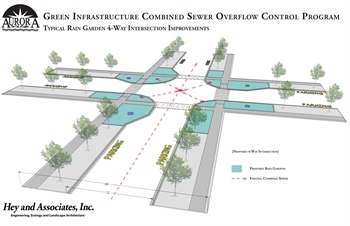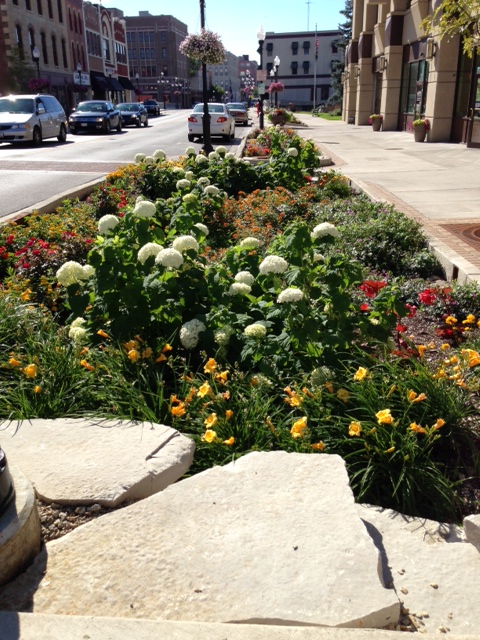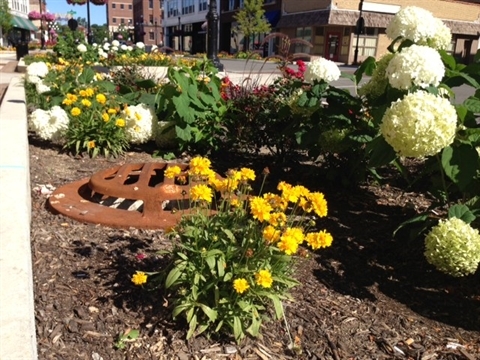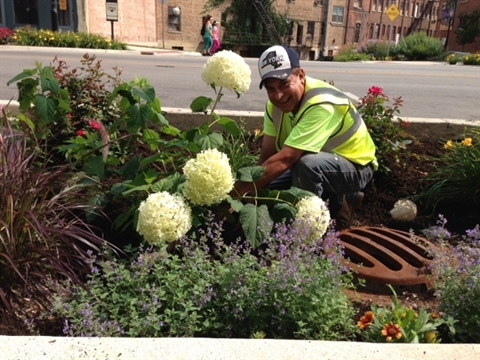
Kristine Liptrot, Metro West Council of Government
Newly installed rain gardens in downtown Aurora capture runoff from surrounding pavement.
With the recently announced expansion of Illinois’ Clean Water Initiative to include funding projects related to stormwater, more money will soon be available for local communities looking to invest in stormwater solutions, particularly green infrastructure solutions. Some communities are already ahead of the game, having taken advantage of the Ill. Environmental Protection Agency’s (IEPA) Illinois Green Infrastructure Grant initiative to install green infrastructure in their communities. One such community is the City of Aurora, Illinois’ second most populous city.
Aurora has both combined sewers—where wastewater from homes and stormwater from streets are combined and sent to a treatment plant—and separate sewers—where stormwater is sent directly, untreated, to a nearby waterway. Because of the risk of backups of sewage-tinged water into basements during heavy rains, the City has invested in the past in separating those sewers, and recently has found green infrastructure—capturing rainwater where it falls using methods that mimic natural systems—to be a more cost-effective solution with added benefits.

Green infrastructure designed as rain gardens with bumpouts into the street can act as a traffic calming measure.
Hey and Associates, Inc.
Built to address water quality issues in Aurora’s downtown and less costly than separated sewers, Aurora’s intersection rain gardens are connected to street inlets that previously sent water to combined sewers for treatment. Instead, the water is redirected to the gardens where it’s filtered slowly back into the ground. These gardens include bumpouts—parts of the curb that jut out to help collect stormwater from the street. Not only do they keep water polluted by dirt and oil from the streets from entering the Fox River via separated sewers—protecting water quality and saving the city infrastructure costs—but they also keep large amounts of water from having to be treated at the Fox Metro Water Reclamation District—saving the treatment plant chemical and energy costs.
Aurora Mayor Thomas Weisner touts the rain gardens as a community amenity in addition to protecting water quality:
We recently added rain gardens to Downer Place in our downtown in conjunction with a bridge replacement project. The bumpouts of the parkway near the intersections helped reduce vehicle speeds and provide a means to beautify the area. While the original intent was to install traditional gardens, we decided to incorporate rain gardens where feasible. Much of the stormwater runoff that would ordinarily end up in the Fox River (just a few feet away) is now absorbed by these lovely rain gardens. We have seen an increase in both bike and foot traffic due to slower vehicle speeds and the more attractive appearance of the area. In all, a friendlier, greener downtown.
Aurora was one of the first round of recipients of an Ill. Green Infrastructure Grant, along with the Metropolitan Planning Council’s Milwaukee Avenue Green Development Corridor. Through this initiative, IEPA has invested nearly $15 million over three years for 36 green infrastructure projects throughout Illinois. In conjunction with the establishment of the Millennium Reserve and the Calumet Stormwater Collaborative—subregional efforts to improve stormwater management in the Calumet region through collaboration—IEPA is planning changes to the Infrastructure Grant, as well as expanding the State Revolving Fund to be able to fund stormwater projects. Lessons from early projects like Aurora’s will help inform how IEPA can prioritize its funding to most effectively address the region’s stormwater problems. Municipal efforts such as Aurora’s can also help signal to local residents and business owners that there is public investment in green stormwater infrastructure and serve as a good example to encourage private property green infrastructure improvements.
One such neighbor is the Metro West Council of Government, located amidst the new rain gardens in downtown Aurora. Only recently planted, employees are already enjoying the aesthetic benefits of what has become more than just a stormwater infrastructure investment. Metro West’s Kristine Liptrot provided several photos of the installation (see photos below).
With these highly-visible green infrastructure investments—the Downer Place project cost almost $145,000, roughly $75,000 of which was paid for by Aurora’s Public Works Division—Aurora has made a big step forward in comprehensively addressing their stormwater concerns and communicating that to the public. This project is part of a larger effort over the years to address water quality and flooding issues and test out green infrastructure. By using what they’ve learned through other projects and taking advantage of the Infrastructure Grant, Aurora has been a leader in addressing stormwater problems through multiple methods for multiple benefits, and doing so in a way that garners the support of businesses and residents.
City of Aurora’s downtown rain garden installations (photo credit: Kristine Liptrot, Metro West Council of Government):

Colorful native plants enliven downtown streets, while also helping calm traffic and ultimately control stormwater.

Overflow drains help collect water that exceeds the capacity of the rain garden and are usually restricted to slow down the water to the sewer system.

Finishing touches on the installation of rain gardens in downtown Aurora. Installation and maintenance of green infrastructure provide new types of employment opportunities.
Aurora’s rain gardens provide a place to store stormwater, while also
beautifying the neighborhood and calming traffic.